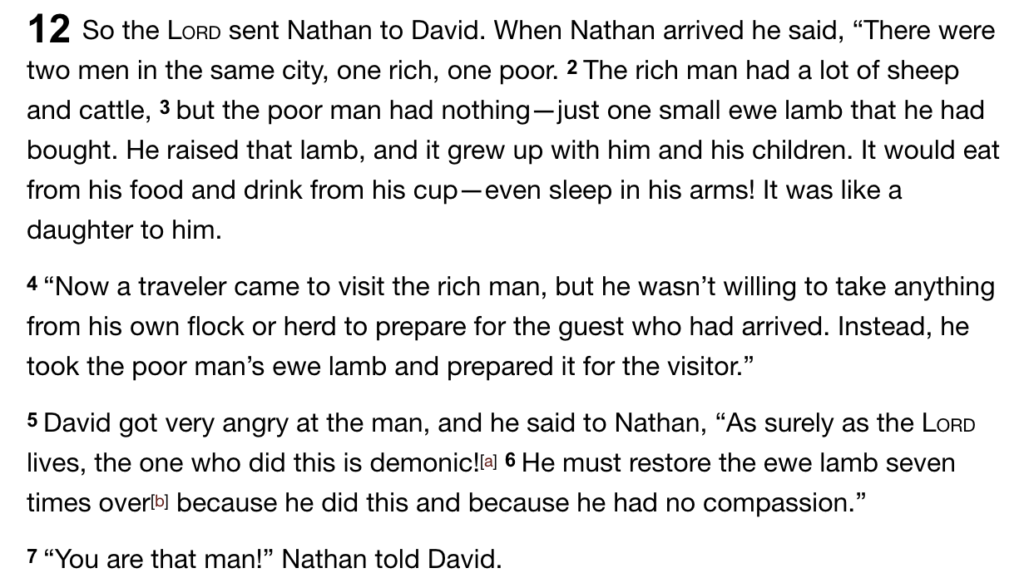David Learns Humility
During the past two weeks, we have witnessed protests, riots, press conferences, statements, tweets, and so much more. We have watched the news unfold with footage that saddens us, angers us, and confuses us, and most of the time, we are left wondering what is left to do? What can be done that will work? That will calm our national level of pain and frustration. That will help to bring healing. That will begin to mend what we have broken and continue to break: relationships with one another. And chances are, we each have some idea of what we would like to see happen. If this person or group would just do this one thing, or this series of things, then we would be on the right track and headed in the right direction.
Unfortunately, others do not always do what we would have them do, and so the cycle of frustration, confusion, and anger continues.
And this, I think, is where we can learn to practice hope. Which may seem odd, because it is often in these moments that we feel most disheartened. And yet, if we believe Jesus is who he says he is, he has come to bring hope to the disheartened. To bring hope to the disenfranchised. To bring hope to the ones who are in despair.
But here’s the catch–this kind of hope requires humility from those who are seated in positions of power, authority, and/or privilege.
In fact, the entire lifestyle that Jesus himself lives and advocates for his followers to adopt works in much the same way. Jesus embodies a position of humility. Philippians 2:5-11 lays this out in a beautiful way, and I would encourage you to read and dwell on that passage this week. We also encounter this when Jesus confronts or meets with people who want to know just exactly what he is up to. When he meets the rich young ruler in Luke 18, Jesus gives this man an opportunity to humble himself. When Jesus encounters Zacchaeus, he invites him to change his life and the way he works to an altogether different way of being and living in the world. When the Pharisees attempt to trap Jesus is discussions about the Law of Moses and how the Jewish people ought to live during a pagan occupation of their homeland (and the entirety of the surrounding world), Jesus sidesteps their trap, and instead does things like bend down to write in the dirt, or pull money from the mouth of a fish.
It’s brilliant! And during every one of these episodes, Jesus offers an opportunity for those in positions of influence to learn what it means to live in the Kingdom of Heaven. Jesus has inaugurated a new vision for how to be human. For how to be a person created in the image of God who is being redeemed and helping his/her fellow person to encounter the saving grace of Jesus. We no longer have to live in a winner-take-all worldview. We don’t have to step on one another to get a leg up. Jesus shows us a different way. The Way that helps bring Heaven to Earth.
So, back to humility. In 2 Samuel 12, a hero king–one that we have been looking forward to since the time of the judges arrives on the scene. And he is built up into an image of the ideal king. His words are poetry. His enemies are defeated in front of him. And he can seemingly do no wrong, for God is with him. That is, until he does wrong. And when he does wrong, he goes all out. Adultery, lying, conspiracy, and murder just to name a few. That’s a pretty bad “rap sheet” for someone who is supposed to be a man after God’s own heart.
And not only that (as if that’s not enough), but this King, David, apparently feels no remorse for his actions. There is no understanding that he has done wrong. No fear or guilt of reprisals (after all, he is the king, and he has taken care of the parties who would be affected by either killing them or making them his wife). And that’s when the prophet Nathan arrives. Nathan comes before David knowing that David cannot simply be told that he is in the wrong. David would have none of that as he feels no remorse for his actions. David needs to come to this conclusion on his own. That will lead to an opportunity for repentance unlike anything else would. And so Nathan tells David a story:

As the scene continues, David hears what God has to say to him through Nathan, and he begins to understand that he has sinned. Later, Psalm 51, a psalm of repentance, will be attributed to David occurring after this very scene. David learns humility, or perhaps more appropriately, David is humbled. He listens to Nathan, he hears the word from the Lord, and he has no option but to repent.
So, what is there to learn from a story like this one? I certainly do not think the lesson is that sin has no consequences. This story does not teach that, and if anything it teaches that sin has frightening consequences. But I do think that we can learn that there is hope in humility.
There is hope in humility not because we ourselves have done something worthy of aspiring to–that is certainly not David’s story. But there is hope in humility because of who God is.
Jesus offers an alternative way of living and being in the world, a way that is close to the heart of God. A way of service and devotion between God and each and every person created in God’s image. A way of compassion, mercy, and love between one another. A way that does not step all over others in order to get ahead or to reach the pinnacle of achievement in our families, careers, relationships, etc. This is a way that offers hope over against the despair of competition. It offers hope because through this way, God offers us his life through Jesus so that we no longer have to push someone else down to raise ourselves up. In fact, Jesus says that the way up is, in fact, down. The way to build yourself up is to build others up first. “Anyone who wants to be first must be the very last, and the servant of all” (Mark 9:35).
May we have the courage to follow Jesus. May we have the courage to listen and love our neighbors. May we learn the hope of humility.

